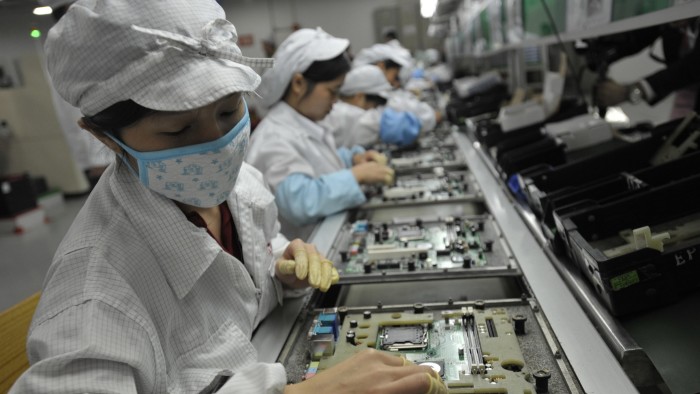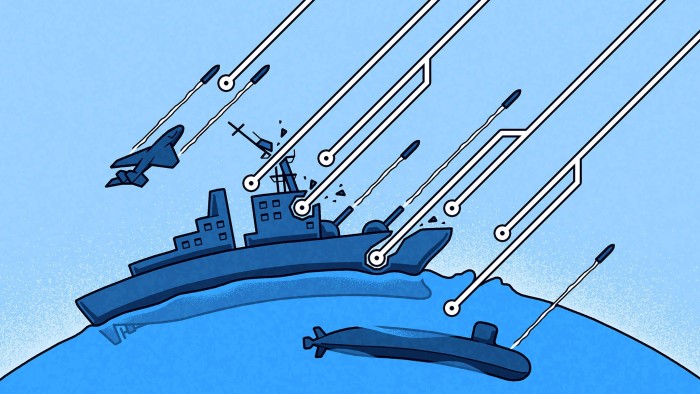Corporate America fears wrath of Trump as it mulls tariffs response

US companies are struggling to figure out how to respond to Donald Trump’s trade war, concerned about the impact of the president’s tariffs on the economy but wary of speaking out for fear of retaliation by the White House, according to executives and board members.
Corporate leaders are unsure of how far to go in re-engineering their businesses in response to Wednesday’s tariffs, amid doubts over how long Trump will stick to his current course and hope that they can lobby him to ease some of the policies.
Complicating matters is a climate of fear created by the White House’s recent targeting of law firms including Paul Weiss.
“You don’t want to be the barking dog for everyone else because you’re going to be the one who will get shot,” said one person who leads the board of a US company.
Another executive on a corporate board said the best approach was to make the case to Trump and his team privately that these policies could hurt his core constituents through higher prices and job losses.
“It is going to be velvet glove lobbying at his more thoughtful policy advisers and that clearly includes Scott,” said another executive on a US board, referring to US Treasury secretary Scott Bessent.
Disney chief executive Bob Iger voiced concern on Thursday at an internal editorial meeting at ABC News, according to people who heard the remarks.
He said that it would not be easy for US companies to shift their production to the country because of specialised workforces and differing skillsets across borders. Iger cited the example of Apple’s Foxconn facilities in China, where the tech giant makes the vast majority of its devices.
Iger also cautioned that Disney itself would be affected. With steel prices likely to rise, the company’s costs of building cruise ships would go up, he said.
Trump’s tariff blitz and China’s retaliation roiled commodity markets, causing crude prices to settle at three-year lows of $65.58 on Friday, with oil traders betting the US administration has no immediate plan to reverse punitive trade measures.
On Friday shale magnate Harold Hamm, executive chair of Continental Resources, told the Financial Times he remained supportive of Trump and his efforts to make fundamental reforms and rebuild US manufacturing by tackling unfair trade practices overseas.
“But it is also true that you cannot drill, baby, drill if you are producing oil and gas below the cost of supply. Shale producers hope the current market turbulence is a temporary situation so they can deliver on the president’s agenda to unleash American energy dominance,” said Hamm, who is also executive chair of industry group Domestic Energy Producers Alliance.
A private equity executive at one of the industry’s largest firms said many companies had analysed and gamed out tariffs to see their impact on their bottom lines and drawn up solutions to be prepared for “liberation day”, when the tariffs were announced.
But that preliminary work was thrown out because the formula the White House used to calculate the tariffs came nowhere near people’s expectations.
Scores of investment firms have or are planning to outline their views on tariffs to clients, many of whom are overseas investors who were shocked by the scope and direction of the levies.
Carlyle Group on Monday will host a “special global investment environment update” call with top investors, in which co-founder David Rubenstein and two other executives are expected to outline a playbook to deal with the tariffs.
Some corporate leaders appealed for calm and did not discount the possibility that the market overreacted.
“While it has been pretty harsh and drastic, we all know stocks have a tendency to overreact and underreact,” said Herman Bulls, vice-chair at commercial real estate group JLL and a board director at USAA, Host Hotels, Fluence Energy and Comfort Systems.
“This is not a surprise in terms of the direction,” Bulls said. “This was talked about during the campaign and when he won.”
The tariffs announcement came midway through the “retail round-up” conference hosted in New York by JPMorgan Chase for executives, investors and analysts in the retail sector.
Home Depot chief financial officer Richard McPhail was among executives who indicated there would now be potentially tense negotiations about shifting the burden of tariffs on to suppliers rather than US consumers.
“In normal course, we are having always-on conversations about cost with our vendors,” he said. “When it comes to tariffs, that’s just another cost in the equation that we have to understand mutually.”
Another retailer, Guess, this week suggested that it could switch away from suppliers in Asia to Latin America, where the tariffs announced tend to be more moderate.
But corporate advisers said there remained too many questions over US policy for companies to be able to commit to large-scale adjustments.
“I think they will stop short of making major supply chain moves because this is not even the beginning of the end,” said Kristin Bohl, a customs specialist at PwC US.
“It’s not even the end of the beginning. There’s far too much uncertainty for a CEO to decide that he or she is going to pick up operations out of country A and move them to country B.”
Reporting by Joshua Franklin, Stephen Foley, Anna Nicolaou, Antoine Gara, Jamie Smyth, Patrick Temple-West and Claire Bushey




